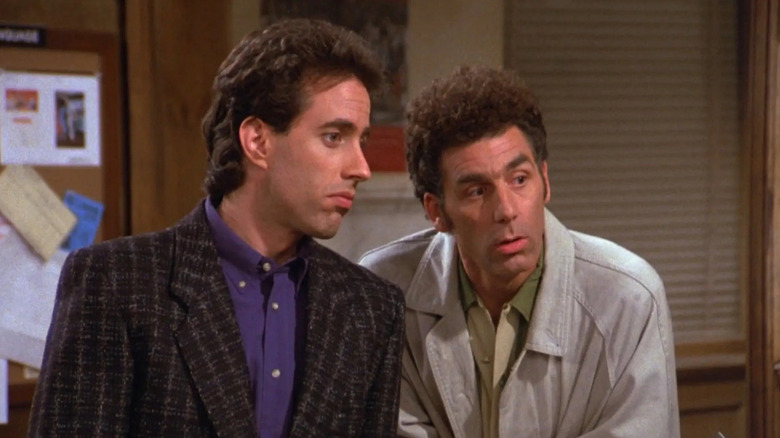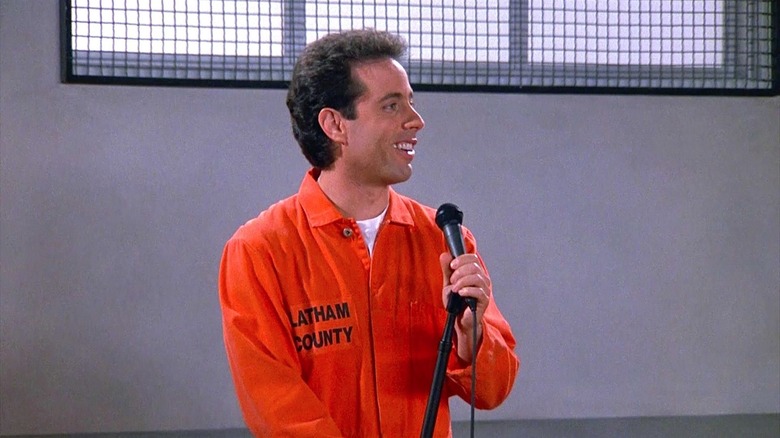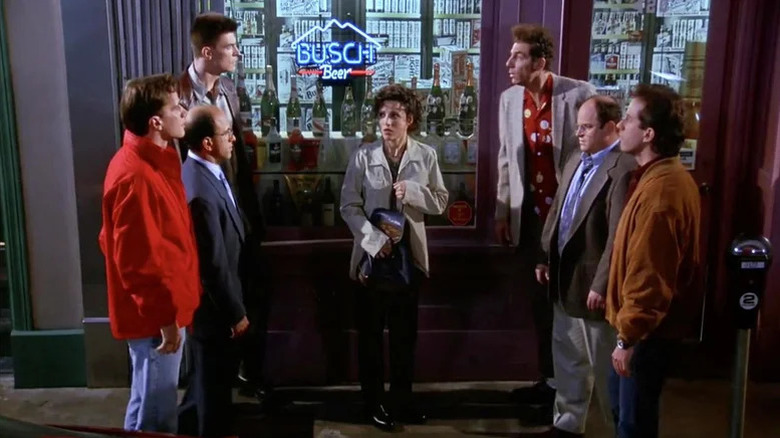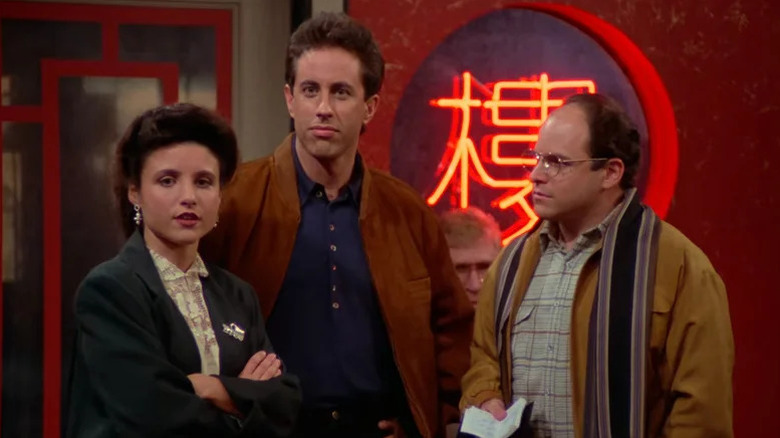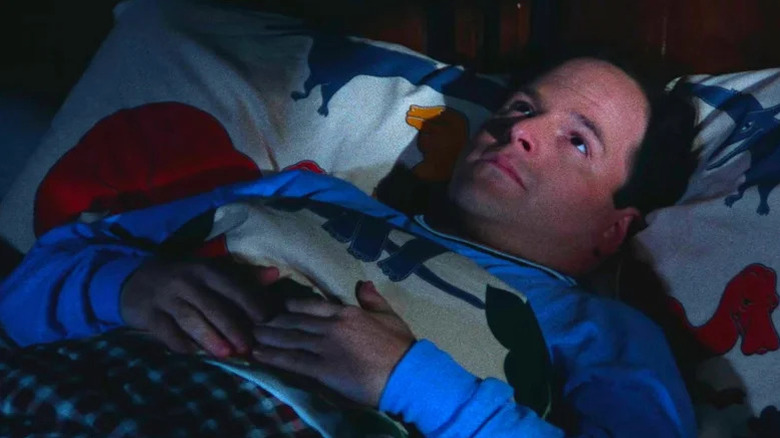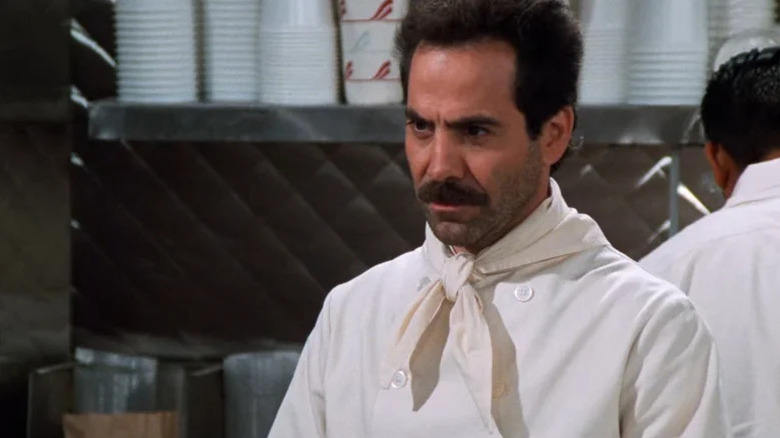5 Essential Seinfeld Episodes Everyone Should Watch At Least Once
"Seinfeld" is one of those rare shows that elicit an opinion from just about anyone, and none of those opinions is a shrug. It's generally considered to be one of the best sitcoms of all time, but on the other hand, many of the worst episodes of "Seinfeld" illustrate how deeply controversial and problematic the series' habitual irreverence could be. In other words, the show is one of those things that you simply have to see yourself to make up your own mind. But what if you don't like the series or otherwise hesitate to devote time to going through all nine of its seasons?
Fortunately, "Seinfeld" is a show that you absolutely don't have to binge. It prides itself on never allowing its characters to truly grow or learn from their missteps, which strips the series of pesky things like character development or long, high-stakes narrative arcs. Apart from the occasional multiple-part plotline, each and every "Seinfeld" episode is just a slightly different story about four self-obsessed jerks and the various messes they end up in. Because of this, the viewer is completely free to just pick a handful of episodes and use them as a brief primer for the series and its perennially morally bankrupt central characters. With the following episodes under your belt, you'll have a fighting chance when it comes to knowing these characters and some of the most famous tropes attached to them. And if watching these leads you to a lengthy nine-season "Seinfeld" adventure, well, it is a very good sitcom.
The Seinfeld Chronicles (season 1, episode 1) & The Finale (season 9, episode 24)
"Seinfeld" is like a sandwich: All the good stuff happens in the middle, but it still needs some crust at the top and the bottom to be complete. That's why I'm lumping the first and last episodes of the series together here — while far from perfect, they're excellent for showing just how little the show changed over the years.
The better episode of the two is "The Seinfeld Chronicles," the series opener. The early shirt button debate between Jerry (Jerry Seinfeld) and George Costanza (Jason Alexander) is a fun way to pull the viewer in, but after that, the plot spends way too much time delving into Jerry's love life (which, let's face it, is almost invariably the show's least interesting element). Also, boo — no Elaine (Julia Louis-Dreyfus) until the next episode.
Fast forward nine seasons, and we get to "The Finale," parts of which Jerry Seinfeld himself regrets. Middling, overstuffed, and unfortunately light on top tier jokes, "The Finale" is less of a great ending and more like the death throes of a show that deserved better. Despite its faults, however, "The Finale" is a must-watch — not only because it's the final episode of an extremely popular series, but also because it ties into "The Seinfeld Chronicles" perfectly. The pilot introduces a bunch of awful, selfish people who are going in circles and unable to grow. "The Finale," and the episode's infamous prison conclusion, finally gives them what's what ... and to prove that they have learned absolutely nothing, the show closes with the exact same shirt button talk that started it.
The Bizarro Jerry (season 8, episode 3)
"Seinfeld" doesn't always make it as immediately obvious to the casual viewer as, say, "It's Always Sunny in Philadelphia," but it runs nigh-exclusively on the fact that its four leads and many of the people surrounding them are absolutely horrible, self-centered individuals who never learn from their mistakes and rarely think of anyone but themselves. The concept becomes increasingly obvious after you watch a few episodes, but if you need to communicate the central group's inherent awfulness to someone right away, put on "The Bizarro Jerry."
Drawing inspiration from "opposite Superman"-themed DC villain Bizarro, the episode revolves around Elaine finding a new and far more attractive friend group after breaking up with the vaguely Jerry-like Kevin (Tim DeKay) and meeting his own pals; namely, George lookalike Gene (Kyle T. Heffner) and Kramer (Michael Richards) expy Feldman (Pat Kilbane). After seeing that Kevin, Gene, and Feldman are nice, supportive and positive people who are the exact opposite of their toxic counterparts, Elaine starts preferring the Bizarro trio's company. However, she doesn't account for one thing: She herself is just as awful as Jerry, George, and Kramer, which leads to the Bizarro team casting her out.
While the main storyline understandably (and deservedly) hogs much of the attention, the subplots involving Kramer impersonating an office worker and George weaseling his way into a model night club are entertaining enough, as is Jerry's increasing frustration with the group abandoning him in pursuit of their various proclivities. The "man-hands" lady B-plot isn't amazing, though — but Jerry rejecting amazing women over trivial details is a major source of the show's comedic fodder, so unfortunately, this sort of stuff just goes with the territory.
The Chinese Restaurant (season 2, episode 11)
On occasion, "Seinfeld" fully delivers on its famous "show about nothing" reputation by simply throwing its characters into the middle of an extremely mundane situation and keeping them stuck there until something gives in. A stellar example of this episode format is the extremely low-stakes yet highly entertaining "The Chinese Restaurant."
As the title suggests, the episode takes place in the waiting lounge of a Chinese restaurant, where Elaine, Jerry, and George are stuck in a limbo of sorts: They're on their way to see the worst movie of all time, "Plan 9 from Outer Space," but want some food first and can't seem to get a table despite the staff assuring them otherwise. This allows the trio to slowly bury themselves in their own, individual pits of selfishness. Elaine's hunger pangs are making her increasingly unstable, resulting in a memorable egg roll dare and a clumsy attempt at bribery. Meanwhile, George experiences relationship woes of the pre-cellphone era as he attempts to contact his girlfriend after a particularly bad faux pas by trying to gain access to a perennially-occupied pay phone. Finally, Jerry's plans to duck out of a dinner meeting with his uncle go increasingly awry when he spots someone who knows said uncle at the restaurant.
All this and many other nonconsequential but amusing events conspire to create the kind of chaos that only "Seinfeld" can. As an added bonus for those who find "Seinfeld" a hard watch after Kramer actor Michael Richards' well-publicised racist stand-up tirade in 2006, this is a rare "Seinfeld" episode that doesn't actually feature his character at all.
The Contest (season 4, episode 11)
Before we go in, a warning: Do not watch "The Contest" with a relative or partner who doesn't have an appropriately twisted sense of humor. If you, for some reason, managed to skip that sentence, let me rephrase: This is the masturbation episode. The titular contest in "The Contest" is a bet revolving around which main character can manage to avoid masturbating for the longest time. Being an early 1990s network sitcom, of course, the show can't actually use that term, which leads to a wonderful balancing act of awkward phrasing that gave birth to the glorious abstinence euphemism of "being the master of your domain."
This is one of those rare sitcom episodes where virtually every single joke is a home run. The whole plot is kicked off when George's mother (Estelle Harris) falls and is hospitalized after catching him in the act with a glossy magazine. The many ways life throws the "Seinfeld" quartet into impossibly horny situations from here are mind-blowing: For one, Elaine (Julia Louis-Dreyfus) crashes and burns with rip-roaring gusto when John F. Kennedy Jr., of all people, unexpectedly enters her life.
From the implausible beginning to the gleefully absurd end, "The Contest" does its absolute level best to push the envelope as far as the early 1990s small-screen environs the show existed in could've possibly allowde for. Punctuated by awkward situations and extremely angry payings of the bet when character after character fails, it's a landmark "Seinfeld" episode — which also makes it a landmark sitcom episode in general. Oh, and amazingly, the ultimate payoff of "The Contest" (which I won't spoil here) somehow doesn't arrive until season 9 and "The Finale," which gives you yet another reason to watch that one.
The Soup Nazi (season 7, episode 6)
The uncomfortably-named season 7 standout "The Soup Nazi" is divisive: Some rank it among the finest "Seinfeld" episodes, while others argue that it rides too hard on the cultural zeitgeist of soup kitchen proprietor Yev Kassem (Larry Thomas) and his "No soup for you" catchphrase. I skew toward the former opinion, especially in the context of this list. Any way you look at it, you'll be hard-pressed to find a "Seinfeld" episode that occupies more cultural space than "The Soup Nazi," which makes it a must-watch by default.
There's plenty to enjoy here, too. Of course, there's Mr. Kassem's delicious soup and arbitrary demands from his clientele. However, let's not forget George and Elaine's all-star work as utility players who shine whether they're driving the soup plot or embrace the side quest about overt baby banter and public physicality between Jerry and his latest fling. The side quest involving the great sidewalk armoire battle between Kramer, Cedric (John Paragon), and Bob (Yul Vasquez) is no slouch, either.
"The Soup Nazi" is "Seinfeld" firing on all cylinders. The episode lets the viewer know exactly what kind of people each of the four main characters are and what sort of offbeat mundanity fills their life. It has even invaded real life, courtesy of the feud between Jerry Seinfeld and the real-life Soup Nazi inspiration — a stern restaurateur named Al Yeganeh, who incidentally even got a lengthy profile in The New Yorker. This isn't the sort of thing you'd expect a normal sitcom episode to revolve around, but then again, "The Soup Nazi" is anything but normal. Is it the funniest "Seinfeld" episode? No, it's not. Is it the most important and watch-worthy one? Oh, yes — by a long margin.
